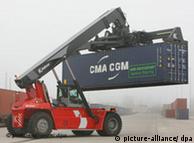TRADE | 23.07.2010
Booming exports worry Germany's neighbors
Until recently, German exports were suffering due to the economic crisis, but those days are nearly forgotten, and exports are taking off again. Statistics showed that the country's exports recovered twice as much as expected in May. Goods worth 77.5 billion euros ($100 billion) left Germany's borders, which represents an increase of nearly 30 percent compared to last year.
"Germany's export model is functioning very well," Michael Heise, chief economist at the Allianz Group said.
Heise added that the companies that rely on industrial exports, as many in Germany do, often suffer worst during an economic downturn.
"That's what explains last year's drop of 5 percent, which was much higher than in other countries," he said, adding that when the economy is doing well, it translates to above average growth for German exporters.
Non-EU exports growing fastest
 The industrial exports that get hit hard in tough times tend to bounce back faster
The industrial exports that get hit hard in tough times tend to bounce back faster
Exports to outside of Europe, with China, India and Brazil leading the way, have been increasing twice as much as exports headed to European nations. That has some in Europe concerned since Germany's trade surpluses are creating deficits for its neighbors.
French Finance Minister Christine Lagarde has said Germany's trade surpluses are due to the minimal salary hikes its workers get and cannot be maintained over the long term. Similar statements have come from the United States, which would like to see Germany do more to boost demand and cut its budget less.
It's a criticism Heise said he can understand.
"It's essential that we increase domestic economic activity and demand in Germany," he said. "That's what foreign countries are demanding as our part in eliminating imbalances - and we're going to have to show some that we're doing something."
Who has to change most?
The disagreement focuses on whether only southern Europe's less competitive nations have to change their policies or if well-off nations like Germany should also do more to contribute to bringing economic balance back to Europe. Even as the euro grows stronger against the dollar, Germany was able to step up its exports between 2000 and 2008 by 65 percent. That was largely because wages lagged behind productivity, which equated to a real devaluation for Germans and kept up the country's competitiveness.
 Views differ on which countries have to take measures to help the whole of Europe
Views differ on which countries have to take measures to help the whole of Europe
Now, with exports rising again, the United States has said Germany, as well as other European nations, should foster the fledgling recovery with stimulus measures rather than slashing public spending. But Germany's government has insisted it will not introduce new economic stimulus packages.
"The strategy cannot be that we start taking on more national debts and artificially expand state consumption," Heise said. "We have to stimulate private consumption and investment demand."
He added that changing labor and employment policies, modifying the tax system and limiting bureaucracy would all contribute to evening out trade imbalances. But there are also more radical measures being considered, some of which call for Germany to give up some of its ability to compete.
More German than the Germans
"It is absurd that Germans advise their neighbors to copy German traits," said Martin Wolf, chief economist at the Financial Times, adding that it would make more sense for Germans to take on debt, boost pay and become more European.
Competitiveness is generally measured by unit labor costs. The European Statistics Office indexed these costs using the year 2000 as its base. Nine years later, the index gives southern European nations a value of about 130, France scored 118 and Germany at 105; showing that most European countries have lost the fight for competitiveness to Germany.
And Germany does not see any reason to turn back the clock on gains it has made.
"We are not going to give up our strengths," Chancellor Angela Merkel said. "That would be the wrong answer for our continent."
Author: Rolf Wenkel (sms)
Editor: Susan Houlton


No comments:
Post a Comment